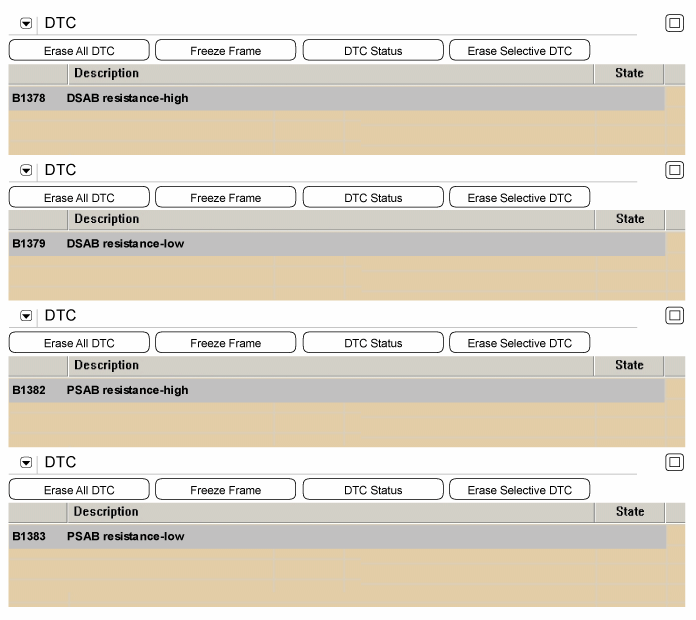Side Airbag
(hereinafter referred to SAB) located in driver and passenger seat
protects passenger's head and shoulder.
SAB is consist of air
bag and inflator. Air bag reduces impact of collision by fillied up gas.
Inflator keeps gas and uses it to deploy air bag on
collision.
|
Never measure resistance of SAB directly,
Current of measuring device may cause unexpected air bag
deploy. |
The SRSCM sets DTC
B1378/B1382 if the measured resistance value of DSAB/PSAB circuit is more
than the threshold value.
The SRSCM sets DTC
B1379/B1383 if the measured resistance value of DSAB/PSAB circuit is less
than the threshold value.
*In this case, SRSCM
checks if there's any fault in circuit by sending current for a
while.
Item
|
Detecting
Condition
|
Possible
cause
|
DTC Strategy
|
|
| •
|
Poor connection of connected
part. |
| •
|
Poor connection between shorting bar
and release pin. |
|
Enable Conditions
|
|
Threshold
Value
|
B1378
B1382
|
|
B1379
B1383
|
|
Diagnostic
Time
|
Qualification
|
|
De-Qualification
|
|
Test Condition
|
Resistance
|
Ignition ON
|
1.6Ω ≤ SAB resistance ≤
4.7Ω
|

| 1. |
Ignition "OFF", connect
scantool. |
| 2. |
Ignition "ON"& Engine "OFF", select
"Diagnostic Trouble Codes(DTC)"
mode. |
| 3. |
Monitor diagnostic trouble code and present
of trouble code. |
| 4. |
Using a scantool, clear the
DTC.

|
| 5. |
Is DTC present problem ?

▶ Go to "W/Harness Inspection"
procedure.

▶ Displaying nothing(no DTC) or DTC with
label "H"(historical) shows that Fault is intermittent caused by
poor contact in the part's and/or SRSCM connector or was repaired
and SRSCM memory was not cleared.
Thoroughly check shorting bar/shorting bar
release pin and connectors for looseness, poor connection, bending,
corrosion, contamination, deterioration, or damage.
▶ Repair or replace as necessary and then go
to "Verification of Vehicle Repair"
procedure. |
| Terminal and Connector
Inspection |
| 1. |
Many malfunctions in the electrical system
are caused by poor harness and terminals.
Faults can also be caused by interference
from other electrical systems, and mechanical or chemical
damage. |
| 2. |
Thoroughly check shorting bar/shorting bar
release pin and connectors for looseness, poor connection, bending,
corrosion, contamination, deterioration, or
damage. |
| 3. |
Has a problem been found?

▶ Repair as necessary and then go to
"Verification of Vehicle Repair" procedure.

▶ Go to "Squib Circuit Inspection"
procedure. |
| 2. |
Disconnect (-) terminal cable from battery
and wait for 1 minutes or more. |
| 3. |
Discooncet SAB module and connect the dummy
(0957A-38200) and dummy adapter (0957A-3F000) to main harness
connector.
|
If dummy and dummy adaptor are not
able to be prepared, use a known-good SAB or 2Ω
resistor. | |
| 4. |
Connect (-) terminal cable to battery and
Ignition "ON" & Engine "OFF" and wait for 30 seconds or
more. |
| 5. |
Connect scantool to Data Link Connector(DLC)
and clear DTC with scantool and diagnose again.

|
| 6. |
Is DTC present problem ?

▶ Go to "Main harness circuit inspection"
procedure.

▶ Substitute a known-good SAB assembly, and
check for proper operation.
If the problem is corrected, replace SAB and
then go to "Verification of Vehicle Repair"
procedure. |
Main
harness Circuit Inspection
| 2. |
Disconnect the battery (-) terminal cable
from the battery and wait at least one
minutes. |
| 3. |
Disconnect SAB connector and SRSCM main
harness connector. |
| 4. |
Measure resistance between terminal "Low"
and "High" of the SAB harness connector.
Specification : approx. 1 Ω
below
|

|
| 5. |
Is the measured resistance within
specifications?

▶ Substitute a known-good SRSCM, and check
for proper operation.
If the problem is corrected, replace SRSCM
and then go to "Verification of Vehicle Repair"
procedure.

▶ Substitute the SRS main harness and check
for proper operation.
If the problem is corrected, replace SRS
main harness and then go to "Verification of Vehicle Repair"
procedure. |
| Verification of Vehicle
Repair |
Refer to the
DESCRIPTION in this TROUBLESHOOTING
section.